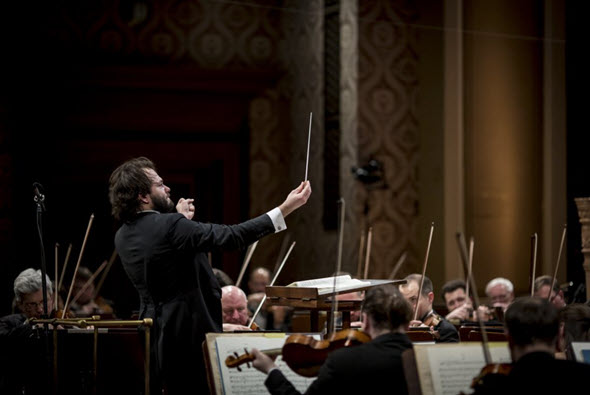In a who-knew debut, Czech conductor leads electric Beethoven with Chicago Symphony
Review: Petr Popelka brought down the house with the Seventh Symphony in a concert with music by Mendelssohn and Schubert.
By Lawrence B. Johnson
Conductors making a debut with the Chicago Symphony are usually preceded by reputation. Which makes an exception of the Czech visitor Petr Popelka, who despite his recent rapid ascent in Europe is a virtual unknown in the U.S. That should change quickly. Popelka’s appearance with the CSO on March 1-2 was a stunning discovery. After hearing his brilliant turn through Beethoven’s Seventh Symphony – twice – I can only assume the CSO will bring this well-schooled and artistically assured conductor back to Orchestra Hall at the earliest possible date.
The 38-year-old Popelka’s story is fascinating and his rise on the Continent quite impressive. He began his musical life as a bass player, joining the Prague Radio Symphony at age 19. Over the next decade he gained notice as a composer and turned his hand to conducting, coming under the tutelage of Alan Gilbert and Jaap van Zweden among others. In 2017, at age 31, Popelka won the Neeme Järvi Prize for conducting, and two years later he was named the first conducting fellow at the NDR Elbphilharmonie Orchestra in Hamburg. Within a year, he was appointed chief conductor of the Norwegian Radio Orchestra, then principal conductor of the Prague Radio Symphony Orchestra. Next season, Popelka becomes chief conductor of the Vienna Symphony.
It was the substance behind Popelka’s rapid emergence that told in his Chicago Symphony debut, especially in his more than commanding approach to Beethoven’s deceptively challenging Seventh Symphony. The work is overtly electrifying, to be sure, but it’s also a harrowing course of pinpoint turns mixed with demands of finesse and, frankly, understatement. I was so taken by Popelka’s authority on all fronts at the March 1 performance that I couldn’t wait to circle back to hear it again the next night.
A movement-by-movement account is unnecessary. The conductor’s clear and purposeful shaping of the contrapuntal undulations of the second movement (Allegretto) and his perfect calm in the eye of the finale’s ripping rhythmic storm pretty much told the whole story. What struck me especially in the Allegretto was Popelka’s mindfulness of Beethoven’s overarching line, the tension he sustained and his respect for the phenomenal Chicago Symphony strings and winds’ ability to knit their sound without the conductor managing connect-the-dots. The musical effect was fluent, supple, eloquent, seductive.
The finale was hair-raising. Popelka launched into it at a rocket speed that not every orchestra can sustain with the CSO’s technical exactitude. But there are also times along the way for letting up – reloading, as it were; and Popelka displayed his confidence and intellectual poise in bringing as much thought and precision to the quiet as he did to the storm. Again, he gave the orchestra its head, conducting in broad phrases or hardly at all, even when the blitz-fast, stop-and-start music, with its furious exchanges between strings and winds, might have seemed to call for a controlling hand. Popelka was there but let the band sizzle, as if to say, “Do check in from time to time.”
Small wonder the packed house answered the last chord with a mad ovation that roared on as Popelka acknowledged solo voices throughout the orchestra – and walked over to personally thank his soul brothers in the bass section.
On a more modest scale, the concert also began auspiciously with an account of Mendelssohn’s “Hebrides” Overture that immediately probed beneath its shining surfaces to reveal the greater depth of this sunny and ever-popular work. While preserving its rhythmic buoyancy, Popelka also summoned the expressive voices of woodwinds from within Mendelssohn’s freely woven orchestral fabric. It was a lovely performance that spoke well of the conductor’s sensibility and craftsmanship alike.
Popelka then turned to Schubert’s exuberant, infectious and much-indebted Symphony No. 6 in C major – in comparison with which the Ninth Symphony came to be known as “The Great C major.” Schubert was about 20 years old when he composed the Sixth Symphony, an adroitly processed melange of Beethoven, Mozart, Rossini and especially Haydn. I’ve always found more charm and frankly originality in the radiant, more contained Symphony No. 5 in B-flat, its obvious roots in Mozart notwithstanding. But conductors seem to love the Sixth, and Popelka led a vivacious performance of Schubert’s stylistic potpourri.




